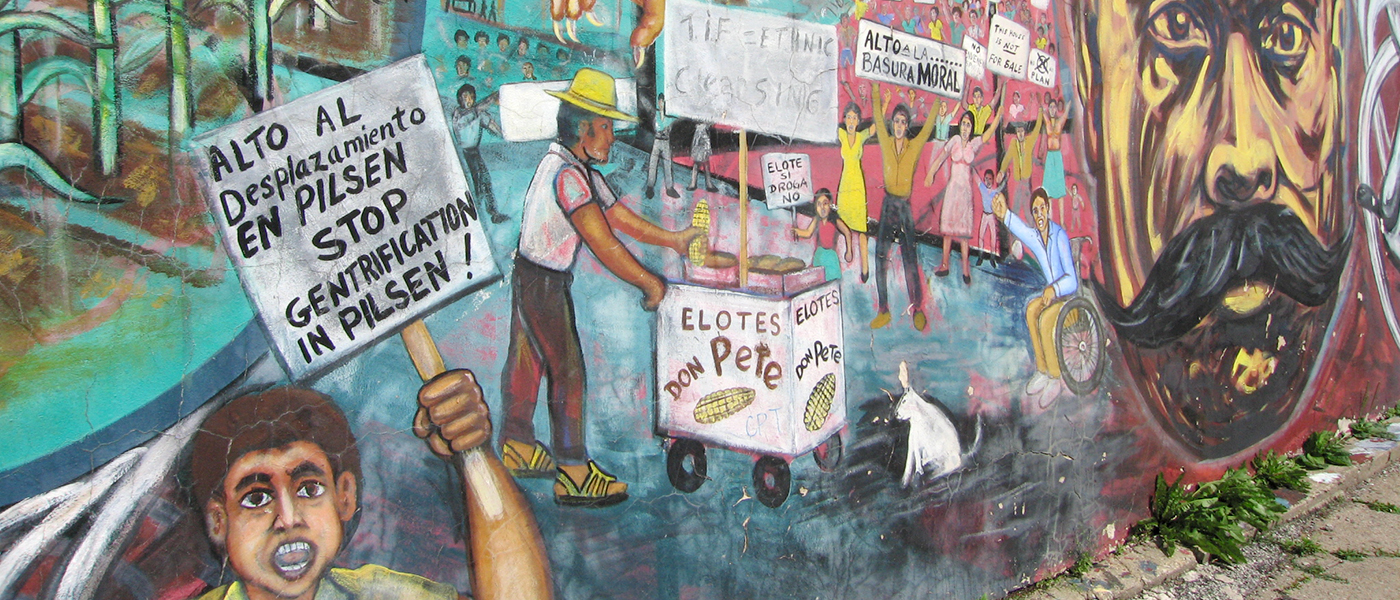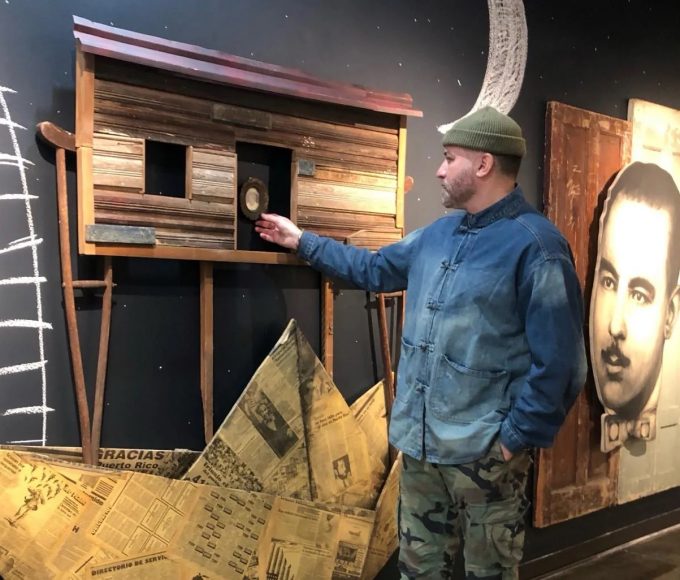Chicago’s rapidly gentrifying pilsen neighborhood successfully shut down a $52 tour spotlighting the area’s changing demographics.
A resident of Pilsen for 14 years, Rosa Esquivel was concerned when she read Chicago Detours’ proposal. Esquivel is the board secretary for Pilsen Alliance, a neighborhood social justice organization representing the area’s working class and immigrants, and she is no stranger to teaching others about gentrification. The Alliance hosts free workshops that educate locals on what gentrification means, its role in Pilsen, and its relationship to available affordable housing. “We ask people to take action and never charge anybody,” says Esquivel.
Chicago Detours is one of several Pilsen-based tours residents have criticized for charging money to spotlight displacement. Amanda Scotese, the company’s executive director, says it had been carrying out the tour in private for a year. When it went public earlier this year, the tours were called out on social media.
“Gentrification is a complex process,” the site said in a statement about the Changes and Spaces in Pilsen Food Tour, pictured below. The link to the Pilsen tour has since been redirected to another page.
“Touring the neighborhood around this contentious process that harms a lot of people (seems) like amusement or gawking. It is minimizing what is happening and packaging in a lightweight way for people.”
Chicago Detours even planned to cover how the tour group itself mirrored gentrification in a neighborhood like Pilsen.
“Tourists may visit a neighborhood like Pilsen to try its famous food, for example, without getting a greater idea of the people [within the] community,” Scotese says. “This tour would have challenged that common experience by explicitly calling attention to the power differentials and consumption-based forces driving the changes going on in Pilsen.”
Scotese said conversations with The Resurrection Project, an organization focused on creating community ownership, led her to believe that the tour and proposed donations would be contentious topics in the community.
“(TRP) stated that the Pilsen community has conflicting views on the programs of many neighborhood organizations,” she says via email. “I already had understood that by offering to donate to them, or any community organization, it would not please everyone.”
Chicago Detours had previously worked with small business owners and artists, Scotese says. Local activists pointed out, however, that several crucial community members and entities were absent from the tour. Among them is Amara Betty Martin, a Pilsen resident, artist and activist. Martin works with the community on issues of displacement through art and resistance efforts. She has called the tour a “brazen” move. “You don’t insert yourself in a place without touching base (with the local community),” Martin says. She questioned why local educators, like those at the National Museum of Mexican Art, were not contacted.
The event further planned to cover issues like the local “evolution of Chicago street gangs” and Mexican immigration to the neighborhood, as well as organizing staffer-narrated pit stops at local restaurant 5 Rabanitos and at several community murals.
Pilsen’s signature cultural art and graffiti include illustrations of Mexican icons from Joan Sebastian to Maria Felix and La Virgen de Guadalupe. Announcements that “el barrio no se vende” are also prevalent on community group door fronts and closed-down local bars around the neighborhood. Beyond its telling art and the quite literal writing on the wall, it’s no secret that Pilsen is pushing back against gentrification. In the 1960s, Mexicans migrated to Pilsen as many Czech and other Eastern European immigrants left to other areas.
But for decades, Pilsen has been grappling with rising rent as the area becomes increasingly desirable for developers operating under a statewide rent control ban. This has led to a demographic shift as fewer low-income Latinx are able to afford rent in the area. According to the U.S. Census Bureau’s data, the neighborhood’s predominantly Mexican Latinx population has decreased by nearly 30 percent from almost 40,000 to 27,000 residents between 2000 and 2015. In 2013, the median household income for Latinx and white residents stood at about $32,000 and almost $42,000 respectively, per a University of Illinois at Chicago study on gentrification in Pilsen. Anti-gentrification activist Lynda Lopez writes that making a dime from demonstrating gentrification reads as “exploitative,” particularly at a time when people are experiencing displacement.
“Touring the neighborhood around this contentious process that harms a lot of people (seems) like amusement or gawking,” she says. “It is minimizing what is happening and packaging in a lightweight way for people.”
The tour, she adds, was familiar. A few months earlier, Chicago Detours hosted a tour in two other neighborhoods with historically large Latinx populations: Logan Square and Avondale. The earlier tour also covered gentrification—this time, from a 37-passenger coach bus, viewing luxury apartments and visiting a new brewhouse.
The company’s website also stated that the group would explore the background of recent neighborhood changes, “like how a mental clinic became a nightclub and tattoo shop.”It all just seemed too comfortable, says Lopez, to discuss gentrification while in a bus or over a beer. To learn about gentrification issues, she implores, “You need to connect with people on the ground and working on these difficult issues.”
The critique brought up a question: when a community is dealing with displacement, is there a right way for people interested in learning more about gentrification to do so? The key to doing it respectfully, says Lopez, is to develop genuine relationships with the neighborhood.
Upon shutting down the Pilsen tour, Chicago Detours announced its intention to make donations to Chicago Community and Workers’ Rights, The Pilsen Alliance, and The Resurrection Project. Local publication Book Club Chicago originally reported, however, The Resurrection Project would not be taking donations from Chicago Detours.
In the case of the Pilsen Alliance, Executive Director Byron Sigcho says the group will likewise not take donations, noting the organization never had any conversations with Chicago Detours prior to the announcement.
“Our organization does not accept donations from corporations, developers, or government agencies in order to maintain our independent and grassroots approach of organizing,” he explains via email.
Scotese confirmed Chicago Detours has no immediate plans to offer more tours like the one in Pilsen.
While activists’ efforts shut down this particular tour, it is only one of many reminders of change within the Pilsen community. In an era when the neighborhood is seeing rising property costs while being called one of the “world’s coolest” areas by Forbes, it is especially crucial for local activists to identify markers of gentrification.
It all leaves other longtime residents of Pilsen wondering what the barrio will look like in the years ahead.
Asks Esquivel: “Once you don’t have the abuelita and the paleteros living in this neighborhood, what are you going to talk about?”
Words by Lyanne Alfaro
To Read More INTELIGENCIA stories like this one, go here.

















Leave a comment